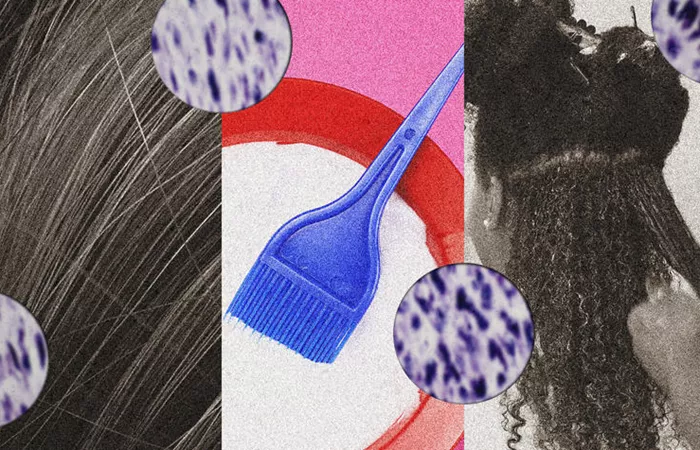There are very few Black women over the age of 40 who have not used relaxers to straighten their hair, and many younger Black women and girls have used them as well. Relaxers remain a common method for straightening tightly curled hair. Many Black women feel pressured to straighten their natural hair due to pervasive hair discrimination in the workplace. An October 2022 study by the National Institutes of Health linked these products to an increased risk of uterine cancer, a finding also supported by the Black Women’s Health Study published by Boston University. Recently, the Food and Drug Administration (FDA) proposed banning formaldehyde and formaldehyde-releasing chemicals in hair straightening products marketed in the U.S.
As an obstetrician/gynecologist and president of the National Medical Association, the oldest and largest group of Black doctors in the U.S., I strongly support the proposed ban and urge the FDA to expand its efforts to protect consumers.
As a Black woman who has used hair-straightening products and experienced hair loss because of them, this issue is deeply personal. The presence of toxic chemicals in hair products contributes to racial health disparities in the U.S. These products have been on the market for many years without proper study, leaving us unable to fully assess the damage they have caused.
Formaldehyde is a known carcinogen. According to the FDA, using hair relaxers with formaldehyde or formaldehyde-releasing chemicals is linked to short-term adverse health effects like sensitization reactions and breathing problems, and long-term adverse effects including an increased risk of certain cancers. However, little action was taken until two Black congresswomen, Rep. Shontel Brown (D-Ohio) and Rep. Ayanna Pressley (D-Mass.), urged the FDA to act in March. “Manufacturers of chemical straighteners have gained enormous profits,” they wrote, “but recent findings unveil potentially significant negative health consequences associated with these products.”
The NIH study found that women who frequently use hair relaxers containing formaldehyde had twice the risk of developing uterine cancer compared to those who did not (4.05% vs. 1.64%). Racial disparities clearly exist in cancer outcomes for Black women compared to white women in the U.S.
Consumers may assume the FDA keeps harmful ingredients out of cosmetic products, but this is not true. Hair relaxers are not FDA approved; they are FDA regulated, and according to Kimberly Bertrand, an associate professor at Boston University, these products are “very poorly regulated.” Manufacturers often mask dangerous chemicals as “fragrance and preservatives,” leaving women unaware of their exposure.
Formaldehyde is not the only problematic ingredient in hair products predominantly used by Black women. Some hair products contain heavy metals and endocrine disruptors like phthalates, phenols, and parabens, all linked to hormonally driven cancers such as uterine, breast, and ovarian cancer. A study by Dr. Tamarra James-Todd at Harvard University found that hormone-disrupting chemicals are more likely to be present in hair products marketed to Black women. About 50% of these products contain these chemicals compared to about 7% of products marketed to white women. These products include hair relaxers, oils, gels, lotions, pressing combs, moisturizers, and leave-in conditioners, which many Black women use daily.
Discrimination exacerbates this issue. For some women, a hairstyle is a beauty choice, but for Black women, it often determines employment opportunities. According to a Harvard Business Review article, Afro-textured hair is stereotyped and stigmatized worldwide. Even in places with protections against race-based hair discrimination, Black women face hair bias.
As a Black woman physician, I felt this pressure. I used chemical hair straighteners and remember the pain of scalp burns. Ultimately, using these products cost me all my hair. I endured this because styles featuring natural Black hair, like braids, twists, bantu knots, or locs, are often wrongly judged as unprofessional. According to the 2019 CROWN Workplace Research study, Black women were 80% more likely than white women to agree with the statement, “I have to change my hair from its natural state to fit in at the office.” The 2023 CROWN Workplace Research study found that over a fifth of Black women (ages 25-34) reported being sent home from work because of their hair. A quarter believed they were denied a job because of their hair, and among Black women ages 25-34, a third believed the same.
Hair discrimination has led to proposed legislation such as the CROWN Act (Creating a Respectful and Open World for Natural Hair), which prohibits race-based hair discrimination in education and employment. Although 23 states have adopted CROWN Act legislation or similar laws, there is still no federal law prohibiting hair discrimination in the U.S.
Despite professional pressures, Black women are increasingly rejecting hair-relaxing products. Sales of chemical relaxers to hair professionals and salons declined from $71 million in 2011 to $30 million in 2021.
The FDA’s proposed ban should be seen as a first step. We need more research into the long-term effects of hair relaxers, clearer labeling on hair products, and reporting requirements for potentially harmful substances. We also need CROWN Act legislation in the remaining states and at the federal level.
Employers should not need legislation to stop discriminating against Black women with natural hairstyles. They should recognize that forcing women to alter their hair chemically for employment is wrong and can increase their risk of cancer.

